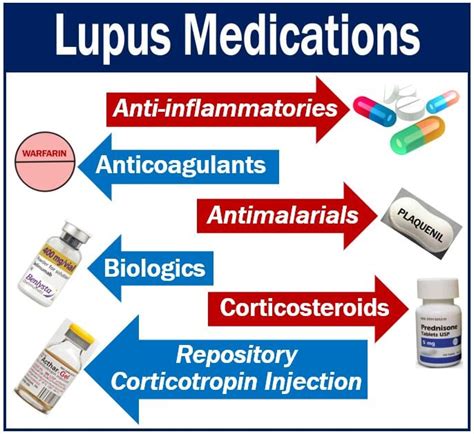Intro
Discover 5 ways to treat lupus, managing symptoms with medication, lifestyle changes, and natural remedies, alleviating inflammation and autoimmune responses.
Lupus is a chronic autoimmune disease that can affect various parts of the body, including the skin, joints, kidneys, and other organs. It is characterized by periods of flares and remission, with symptoms ranging from mild to severe. Living with lupus can be challenging, but there are several treatment options available to manage the condition and improve quality of life. In this article, we will explore five ways to treat lupus, including medications, lifestyle changes, and alternative therapies.
Lupus is a complex disease, and its treatment requires a comprehensive approach. While there is no cure for lupus, early diagnosis and treatment can help control symptoms, prevent complications, and reduce the risk of organ damage. Treatment plans are often individualized, taking into account the severity of symptoms, the presence of other health conditions, and the patient's overall health status. By understanding the different treatment options available, individuals with lupus can work with their healthcare providers to develop an effective plan to manage their condition.
The treatment of lupus has evolved significantly over the years, with new medications and therapies being developed to target specific aspects of the disease. From nonsteroidal anti-inflammatory drugs (NSAIDs) to biologics, the range of treatment options has expanded, offering hope to individuals with lupus. In addition to medications, lifestyle changes, such as maintaining a healthy diet, exercising regularly, and managing stress, can also play a crucial role in managing lupus symptoms. By combining these approaches, individuals with lupus can reduce their symptoms, improve their quality of life, and increase their chances of achieving remission.
Medications for Lupus

Medications are a crucial part of lupus treatment, and several types of drugs are used to manage symptoms and prevent complications. The most commonly used medications for lupus include NSAIDs, corticosteroids, immunosuppressants, and biologics. NSAIDs, such as ibuprofen and naproxen, are used to reduce pain and inflammation, while corticosteroids, such as prednisone, are used to suppress the immune system and reduce inflammation. Immunosuppressants, such as azathioprine and cyclophosphamide, are used to prevent the immune system from attacking healthy tissues, and biologics, such as belimumab, are used to target specific molecules involved in the disease process.
Types of Medications
The choice of medication depends on the severity of symptoms, the presence of other health conditions, and the patient's overall health status. Some medications may be used alone or in combination to achieve the best results. For example: * NSAIDs are often used to manage mild to moderate symptoms, such as joint pain and inflammation. * Corticosteroids are used to manage moderate to severe symptoms, such as kidney inflammation and skin rashes. * Immunosuppressants are used to manage severe symptoms, such as kidney damage and neurological problems. * Biologics are used to manage severe symptoms, such as kidney inflammation and skin rashes, that do not respond to other treatments.Lifestyle Changes for Lupus

In addition to medications, lifestyle changes can play a crucial role in managing lupus symptoms. Maintaining a healthy diet, exercising regularly, and managing stress can help reduce symptoms and improve quality of life. A healthy diet should include plenty of fruits, vegetables, whole grains, and lean proteins, and should limit processed foods, sugary drinks, and saturated fats. Regular exercise, such as walking, swimming, and yoga, can help reduce stress, improve mood, and increase energy levels.
Stress Management
Stress can exacerbate lupus symptoms, and managing stress is essential to controlling the disease. Some effective stress management techniques include: * Meditation and mindfulness * Deep breathing exercises * Yoga and tai chi * Journaling and writing * Spending time in natureAlternative Therapies for Lupus

Alternative therapies, such as acupuncture, massage, and herbal supplements, may also be used to manage lupus symptoms. Acupuncture, for example, has been shown to reduce pain and inflammation, while massage can help reduce stress and improve mood. Herbal supplements, such as turmeric and ginger, may also be used to reduce inflammation and improve symptoms.
Herbal Supplements
Some herbal supplements that may be beneficial for lupus include: * Turmeric: reduces inflammation and improves symptoms * Ginger: reduces inflammation and improves digestion * Omega-3 fatty acids: reduces inflammation and improves heart health * Probiotics: improves gut health and reduces inflammationDietary Changes for Lupus

Dietary changes can also play a crucial role in managing lupus symptoms. A healthy diet should include plenty of fruits, vegetables, whole grains, and lean proteins, and should limit processed foods, sugary drinks, and saturated fats. Some foods that may be beneficial for lupus include:
- Fatty fish: rich in omega-3 fatty acids, which reduce inflammation
- Leafy greens: rich in antioxidants, which reduce inflammation and improve symptoms
- Berries: rich in antioxidants, which reduce inflammation and improve symptoms
- Whole grains: rich in fiber, which improves digestion and reduces inflammation
Foods to Avoid
Some foods that may exacerbate lupus symptoms include: * Processed meats: high in saturated fats and sodium, which increase inflammation * Sugary drinks: high in sugar, which increases inflammation and worsens symptoms * Refined carbohydrates: high in sugar and refined flour, which increase inflammation and worsen symptoms * Foods high in saturated fats: increase inflammation and worsen symptomsExercise and Lupus

Regular exercise is essential for managing lupus symptoms and improving quality of life. Exercise can help reduce stress, improve mood, and increase energy levels, and can also help improve sleep quality and reduce fatigue. Some exercises that may be beneficial for lupus include:
- Walking: low-impact exercise that improves cardiovascular health and reduces stress
- Swimming: low-impact exercise that improves cardiovascular health and reduces stress
- Yoga: low-impact exercise that improves flexibility and reduces stress
- Tai chi: low-impact exercise that improves balance and reduces stress
Exercise Tips
Some tips for exercising with lupus include: * Start slowly: begin with short, gentle exercises and gradually increase intensity and duration * Listen to your body: rest when needed and avoid overexertion * Stay hydrated: drink plenty of water before, during, and after exercise * Avoid extreme temperatures: avoid exercising in extreme heat or coldWhat are the most common symptoms of lupus?
+The most common symptoms of lupus include joint pain and inflammation, skin rashes, fever, fatigue, and kidney problems.
How is lupus diagnosed?
+Lupus is diagnosed through a combination of physical examination, medical history, laboratory tests, and imaging studies.
What are the treatment options for lupus?
+Treatment options for lupus include medications, lifestyle changes, and alternative therapies, such as acupuncture and herbal supplements.
Can lupus be cured?
+There is no cure for lupus, but early diagnosis and treatment can help control symptoms, prevent complications, and improve quality of life.
How can I manage lupus symptoms?
+Lupus symptoms can be managed through a combination of medications, lifestyle changes, and alternative therapies, such as maintaining a healthy diet, exercising regularly, and managing stress.
In conclusion, lupus is a complex disease that requires a comprehensive treatment approach. By combining medications, lifestyle changes, and alternative therapies, individuals with lupus can manage their symptoms, improve their quality of life, and reduce their risk of complications. It is essential to work with a healthcare provider to develop an individualized treatment plan that takes into account the severity of symptoms, the presence of other health conditions, and the patient's overall health status. By taking an active role in managing their condition, individuals with lupus can achieve remission and improve their overall well-being. We encourage you to share your experiences and tips for managing lupus in the comments below, and to share this article with anyone who may be affected by this condition.
